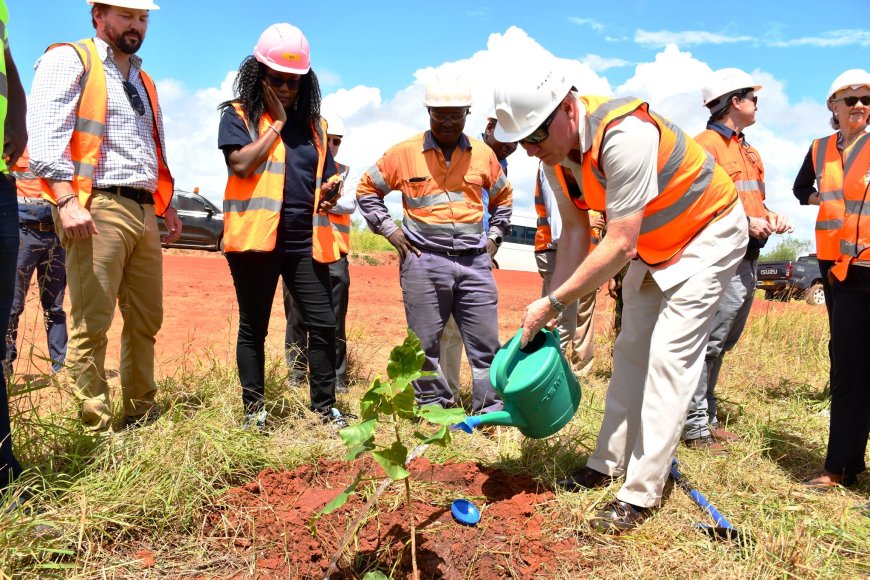Kwale mine land rehabilitation gathers pace

Kwale
Tuesday, August 29, 2023
KNA by Hussein Abdullahi
Kwale-based Australian mining firm Base Titanium is rehabilitating its post-mining landforms with a safe, stable, and sustainable land cover.
Mine rehabilitation is a restoration process ensuring that land used in mining is made available for economic activities, conservation, and diverse community uses.
Base Titanium is routinely rehabilitating areas disturbed by mining activities to a condition that is safe, stable, and non-polluting.
The mining firm Located in the Msambweni sub-county simply known as Base produces ilmenite, rutile, and zircon which are all considered critical minerals.
In an effort to extend Kwale Operation’s mine life beyond December 2024, the mining company is seeking to identify additional mineral deposits that may lie in proximity to the existing operational zones.
Base Titanium owns and manages Kwale Sand Operations, a high-grade mineral sands mine that commenced production in 2013.
The mining firm has also lined up exploration works in more areas in Kwale and Lamu counties, with an eye on Tanzania but the prospecting activities have been slowed down by a freeze on new licenses.
Base Titanium General Manager (GM), External Affairs Simon Wall says the company is slowly transitioning into a progressive rehabilitation and mine closure plan.
“Our rehabilitation activities are focused on reforestation, increasing biodiversity, and developing agricultural opportunities for our host communities,” said Wall, adding that the ongoing mine rehabilitation activities are about restoring landscapes for future use after mining activity.
Mr Wall says Base Titanium’s commitment to sustaining the environment has ensured the continuous protection of land, flora, fauna, and humans, and the general operating environment.
He says after mining finishes, the mine area must undergo environmental rehabilitation and restoration to minimize land loss and ensure it benefits society once again as a natural landscape.
“We are undertaking sound environmental rehabilitation and restoration works to minimize land loss and ensure mined-out sites are returned to a condition similar to before any mining took place,” he said.
He was speaking when he received a high-level delegation from the United States and Australian Embassies led by Meg Whitman, US Ambassador to Kenya, and Luke Williams, Australian High Commissioner to Kenya at the Kwale Mine Site.
The envoys were on a familiarisation visit to understand and have a glimpse of Base Titanium’s World Class Mining Operations including its rehabilitation and ecological restoration on mined-out land.
The two Ambassadors also had an opportunity to plant trees on mined-out land, which Base Titanium has dedicated to planting 6,000 trees in honor of their visit.
Wall says an actively revegetated mine sites can typically be restored to an ecological restoration and vegetation cover level that equals or is better than the pre-mining situation.
He says the rehabilitation of mined-out areas begins by shaping the area into dunes similar to those that existed before mining to ensure natural drainage areas are followed.
Wall says sustainable conservation, rehabilitation and ecological restoration programs are now focused on the mined-out areas of the South and Central Dunes.
“After that shaping and topsoil spreading, manuring and mulching is done to enhance soil organic matter to prepare for vegetation,” he said.
Wall says Base Titanium is continually investing in environmental responsibility and protection to prevent pollution while increasing the efficiency of production facilities, and improving environmental procedures and measures.
He says the mining sector is evolving as ecological rehabilitation reflects the important social obligations facing mining firms who are socially licensed to operate on the condition that their actions support future land uses.
The External Affairs GM says the Base Titanium seeks to stand out as a testament to the benefits of progressive rehabilitation when re-establishing native vegetation and fauna.
He said so far the mining company has been able to rehabilitate more than 200 hectares of mined land involving filling the mine pits and covering the land with native grass and tree species.
The top mining official says mine restoration although performed after mining is completed is usually best suited when planned before mining and conducted throughout the mining process lifecycle-referred to as progressive mine rehabilitation.
He says as mining represents a transient use of the land the ultimate goal of mine restoration projects is restoring functionality or preparing the site for other beneficial social, historical, environmental, or economic uses while minimizing interference with sensitive ecosystems and restoring biodiversity.
Wall says Base Titanium is cognizant of the fact that modern mining is transforming into a system based on sound ecological or responsible mining principles which encompass comprehensive resource utilization with low environmental impact and ecological restoration of the damaged ecosystems.
“We are out to ensure that ecological rehabilitation is integrated into our mine planning process, with progressive rehabilitation plans in place to ensure continuous land reclamation throughout the mine life,” he said.
The Kwale Mine is accredited as a Kenya Vision 2030 flagship mining project and represents a significant impact on the local and national economy.
Wall says as the largest mine in Kenya, Base Titanium has been and continues to be a huge success contributing about 65 percent of Kenya's mineral output value.
He stated that agricultural tests with locally available crops have been conducted to demonstrate that the rehabilitated land can support the desired post-mining land use.
As part of its conservation and restoration program, Base has established an indigenous tree nursery to propagate and replant endangered plant species in Kwale.
Base’s indigenous tree nursery is considered one of the largest in East Africa with a total of 274 different species and 14,062 trees being of conservation significance.
Wall says Base Titanium currently has over 37,000 indigenous trees in stock at the Kwale operations indigenous tree nursery ready for land rehabilitation and reforestation.
Courtesy ; K. N. A
What's Your Reaction?



































































































































































































































































































